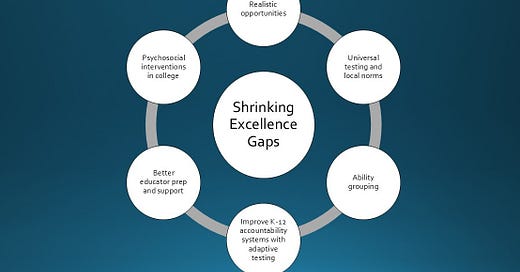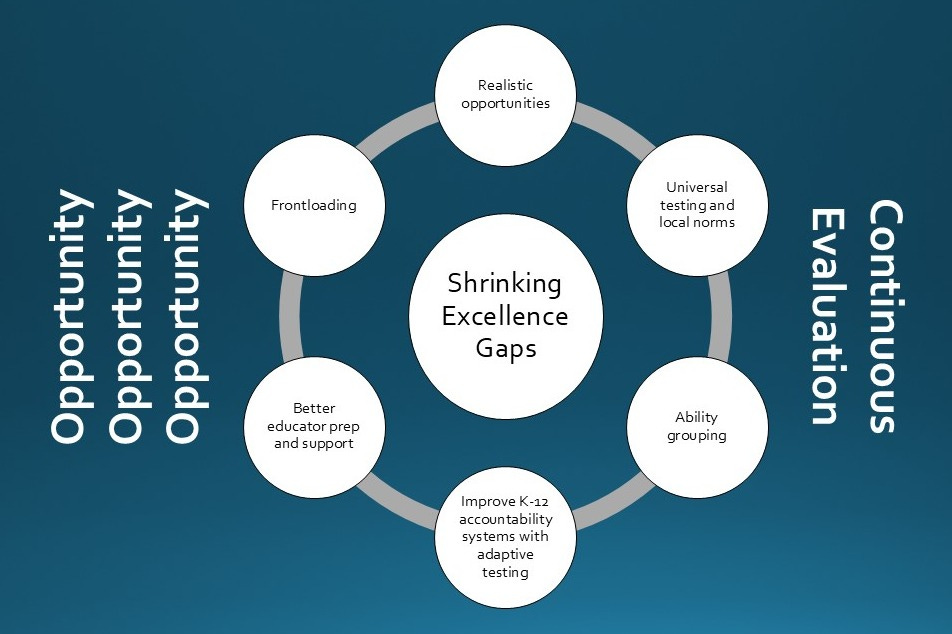Just when you started to forget about your subscription to this monthly newsletter … BAM! More knowledge (and jade plant content) in your inbox!
You can continue to do me several favors:
Pass this issue to friends and colleagues who may enjoy it. (Subscribe button at the bottom of this issue)
Suggest topics you’d like to see tackled both here and in the podcast.
If you’re wondering why “Everyone Has a Plan” for the title, check out the “About” section on the home page.
Without further ado …
Something Short
There have several good reports and white papers recently on advanced education. Check out my overview of this work in a recent blog post on the Fordham Institute’s Flypaper Blog. I continue to be grateful to my Fordham colleagues for their support of advanced education and of my team’s work.
Something a Bit More Involved
My colleagues and I have published a few recent papers, and I’ve picked two to share this month. If you click on the titles, you should be able to get past the firewall to read them online.
The first is Global Trends in Excellence Gaps From 1995 to 2019 with my colleagues Leslie and David Rutkowski. A dozen years ago, we looked at international test data to see if there were trends in advanced performance and excellence gaps (achievement gaps at advanced levels). We decided to do the analysis again with several more years of data, specifically examining math and science achievement in 12 countries that have consistently participated in the TIMSS assessment over the years in question. To examine excellence gaps, we looked at student gender and immigrant status (socioeconomic status and race/ethnicity aren’t easy in this context given the diverse international sample).
We found that advanced performance in both math and science is generally flat. Regarding excellence gaps, sex gaps in science and immigrant gaps in mathematics appear to be shrinking significantly, with little variability across countries. But sex gaps in mathematics are mixed, and immigrant gaps in science are shrinking but with more intercountry variability.
So a mixed bag: Advanced performance has largely stalled out over the past quarter century, although some excellence gaps are shrinking (and some are not). Given all the technological and economic advances over this long timeframe, the lack of progress regarding academic excellence is worrisome. Perhaps the general global neglect of advanced education is the problem here? (sarcasm intended)
Many of you have heard me say this, but 10-15 years ago I was sympathetic to educators and policymakers who threw their hands up and said things like, “We just don’t know what to do here!” But that’s inexcusable now, as we have a wide range of research-supported and field-tested interventions, many of which are low- to no-cost and easy to implement.
Which brings me to the second article, Reducing Excellence Gaps: A Systematic Review of Research on Equity in Advanced Education with Melanie Meyer and Ashley Shen. Back in 2016, Scott Peters and I conducted a detailed analysis of interventions to close excellence gaps and raise advanced achievement. As we wrote our book on the topic, I realized our analysis led to a pretty easy-to-understand model of how to close excellence gaps.
The purpose of this new paper was to determine if the ensuing decade of research on equity and advanced learning supported the 2016 model. Melanie and Ashley did the lion’s share of the work on this project, and it was a lot of work - as mentioned above, the past 10-15 years have seen an explosion of research on these topics. They reviewed it all, and our conclusion is that the vast majority of new research supported the model. Based on this study and our work in schools across the country, I now use this version:
The big changes are straightforward: We removed psychosocial interventions because the last decade of research has not been positive in this area. We added frontloading into the model; it was an assumed precondition of the 2016 model, but it is such an important part of equitable advanced education that we pulled it into the model graphic. Continuous evaluation was added as a foundational element because there is no finish line when it comes to advanced performance and closing excellence gaps. And we added opportunity as a foundational element because far too many districts still limit access to advanced services. You have to grow the pie, not divide the pie up differently!
Some Recent Things that Intrigued Me
The macroeconomist Noah Smith had a great quote recently:
“Nobody is out there running a randomized controlled trial to see if
fire is really what makes things burn.”
In a similar vein, we don’t have RCTs showing that smoking is bad for you. I’ve been in meetings where researchers demand experimental evidence of any opinion someone shares, which is super annoying. Sometimes descriptive research is more than sufficient to help guide policy, let alone other forms of inferential stats that fall short of RCTs. This all came to mind when I read this stunningly good paper by Matt Kraft and Melissa Lyon on the status of the teaching profession over the past 50 years. Using a wide range of high-quality, descriptive data, they paint a detailed picture of how the status of the teaching profession has changed. Spoiler alert: It has changed a lot. Friends have teased me for fanboying so hard about this paper, but it is that good. Read it and tell me if I’m wrong!
This New York Times profile of Oklahoma state superintendent Ryan Walters annoyed me to no end, but it’s still worth a quick read. His performative approach to policy isn’t what ticked me off! Rather, this piece could have been so much better: What’s Walters’ motivation for his actions? The author implies it’s political opportunism, but is that it? And how on earth can there be no mention of the controversy about the state’s unannounced lowering of cut scores on their state assessment? It is very odd to crow about your students’ test results when you purportedly knew that the results are largely the result of statistical manipulation. Did they think people wouldn’t figure it out? Isn’t lying covered in the Trump Bible? So many questions!
David Brooks’ recent article on meritocracy has garnered lots of reactions, some complimentary and some critical. I readily admit to not having read the piece (paywalls!), but I’ve listened to a few hours’ worth of Brooks making his argument on a number of podcasts. The best response I’ve read is this piece by Checker Finn. The only thing I’d add is that Brooks repeatedly makes statements about how “the research” shows that intelligence doesn’t matter for workplace success. I have studied human intelligence for many years (see here and here, for example), and I’m on record as being skeptical that it is the be-all-end-all of human success. But to say that intelligence doesn’t matter is so silly that it’s hard to take anything else in Brooks’ argument seriously. I could cite hundreds of studies on the importance of intelligence, but I’ll just point you to this body of work. Being smart - or, if you want to extend my logic, being talented - is a huge step toward success in any domain or field.
Finally, it’s rare that a policy opinion piece makes me laugh out loud, but that was the case when I read the generally interesting piece, Here’s How to Actually Reverse the Baby Bust, by Jay Greene and Lindsey Burke of The Heritage Foundation. They do a good job describing the urgency of the very important - and underemphasized - problem of sharply declining fertility rates. They also share provocative thoughts about what will and won’t work to address the problem (I don’t buy their argument, but it’s worth considering). That said, I was not ready for the comment at the end about how private school vouchers will help reverse the fertility problem. Their logic is, to be gentle about it, something you will need to see to believe. Read this short piece and come to your own conclusions about it, but wow, that ending. (Ironically, we actually could do RCTs to answer this question, using the original sample and control group from the Cleveland Scholarship Program!)
Some Things I Found to be Cool
The novels of Hiromi Kawakami. I stumbled across Strange Weather in Tokyo and thought it was fun, so I gave The Nakano Thrift Shop a try. That was also a good, quick read, and I’m now working through Under the Eye of the Big Bird. All are completely different (that’s an understatement!) but enjoyable. One of my criticisms of Japanese novels is that the translations are often quite rough - I enjoy reading Murakami, too, but some of his translators do him no favors. Kawakami’s short novels, at least thus far, have read smoothly for me, so kudos to her and her translators.
The last Batman movie, titled, er, The Batman. As we were running errands tonight, Kathleen asked me who my favorite Batman was. I ranked them in tiers: Keaton and West, Bale, Clooney and Kilmer … and after rewatching The Batman, I’m leaning toward putting Robert Pattinson in the first tier. Blasphemy, you say! Hear me out: Batman is the rare superhero who doesn’t have superpowers. He is “the world’s greatest detective,” and the latest film is probably the most accurate depiction of that role. The Max spin-off series The Penguin is also excellent, and let’s all take three minutes to watch the greatest action sequence in the history of the movies.
The Hulu series Interior Chinatown. I’m only halfway through this series, but it is quite good. It’s entertaining, but it’s also a soft-edged commentary about Asian American stereotypes and a satire of crime-of-the-week cop shows. I’d heard about the show but only decided to watch it after hearing this interview with the series star, Jimmy O. Yang, on Fresh Air. I’ve never found Yang’s stand-up to be my cup of tea, but this interview was very interesting, and he’s a great actor. The series is based on the novel of the same name, which was generally considered to be “unfilmable.” As you can imagine, turning the unmakeable into the makeable involves a fair amount of creativity, and I’m here for it.
Some Things to Consider
With the holidays soon upon us, there aren’t a ton of events coming up. I’m headed to the annual International School Choice and Reform Conference in Ft. Lauderdale from January 17-20th. My colleagues and I will be presenting a couple papers, and we look forward to getting input from the pro-choice researchers, advocates, and practitioners in attendance. This is one of those annual events where I love to sit in the back of the room, listen to what people are working on, and get a sense of the temperature of the audience. For example, two years ago, I noticed a sharp divide between advocates and researchers who believed (a) charter schools had not lived up to their potential for innovation and those who believed (b) they absolutely had lived up to that potential. It got heated, and these were all pro-charter folks! I shall report back on the major themes and any spirited disagreements.
Jade Plant of the Month
My love for jade plants began simply enough: My parents had recently moved to San Diego, and their backyard was filled with large bushes of wild jade. As my family left after a visit, my mom handed me three jade leaves that she had just pinched off of the bushes. She gave me instructions for turning them into their own plants, and although skeptical, I followed her advice.
Sure enough, I had three jade plants within months. One crossed the shamrock bridge when I accidentally left them outside during a hard frost, but the other two recovered and survive to this day. The fact that these plants each grew from a leaf amazed me, and it’s been a fun hobby ever since. This month’s jade plant is one of those originals. It is roughly 20 years old, and as you can tell from the red edges and flowers (yes, very happy jade plants will flower!), it has never been happier.


I keep the original jades in medium-sized pots, primarily to restrict their size (a trick learned from books on growing bonsai trees). One summer, my dad decided to remove all the jade bushes from the yard; by the time we visited the following summer, the jade had completely grown back and filled the yard again. If you give jade an inch, it will take the yard! (That’s both a dad joke and a jade joke!)
Happy Holidays and best wishes for a fun, relaxing, and healthy festive season.
Where to Find Me
http://Amazon.com/author/jonathanplucker
www.linkedin.com/in/jonathanplucker





